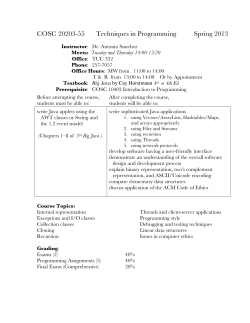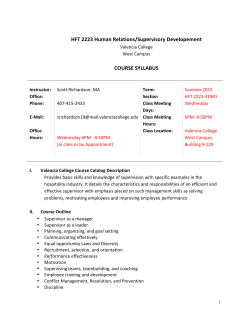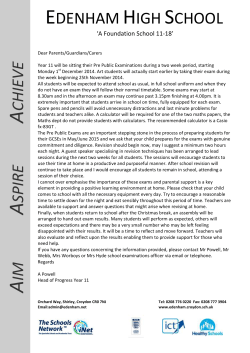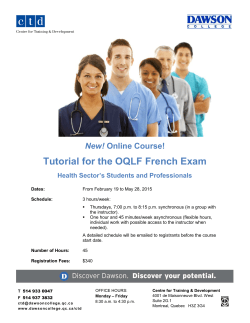
PHYSICS 2420 Introductory Mechanics Spring 2015 Instructors
PHYSICS 2420 Introductory Mechanics Spring 2015 Instructors: Lecture: Roy Joaquín Montalvo E-Mail: rmontalvo@utep.edu Office: PSCI 215A Lecture: Mondays and Wednesdays 10:30 – 11:50 AM Office Hours: MW 1:00 – 2:00 PM or by appointment. Website: http://hep.utep.edu Workshops: Surendra Bhatta Shusil Bhusal William Burman Irving Martinez E-Mail: surenbhatta2@gmail.com Workshop: R 8:30 AM – 9:20 AM F 11:30 AM – 12:20 PM Office Hours: TR 4:30 PM – 5:30 PM PSCI 217C E-Mail: sbhusal@miners.utep.edu Workshop: R 4:00 PM – 4:50 PM T 2:00 PM – 2:50 PM Office Hours: F 1:00 PM – 3:00 PM PSCI 216 E-Mail: wdburman@miners.utep.edu Workshop: T 9:00 AM – 9:50 AM R 9:30 AM – 10:20 AM Office Hours: T 10:00 AM – 12:00 AM PSCI 126 E-Mail: imartinez20@miners.utep.edu Workshop: M 3:00 PM – 3:50 PM M 4:00 PM – 4:50 PM Office Hours: M 1:30 PM – 3:00 PM W 11:30 AM – 12:00 PM PSCI 216 Textbook: Young and Freedman, University Physics With Modern Physics 13th Edition Homework: Homework assignments will be posted regularly and will be completed online. To do this, each student must sign in to Mastering Physics (http://masteringphysics.com) using the course ID: SP2015MECHANICS Exams: There will be at least 3 exams and one comprehensive final exam. All exams are closed book and closed notes. Physics is not about memorization so I will give you all the relevant formulas and equations for each exam. A scientific calculator is recommended. Note: There will be no breaks during exams, if you leave the classroom you must turn in your exam and will not be allowed back in. For exams you should expect any of the following types of questions: -Multiple choice: These might be conceptual questions or problems. Only the correct answer marked on the correct bubble in the scantron will get you credit. It is recommended that you always bring a 2nd scantron since partially erased bubbles may be marked as wrong. We will not review or change scantron grades, it is your responsibility to make sure your scantron is clean and unwrinkled before you turn it in. -Open problems: For these, your physical reasoning is the most important part and it will usually be worth ⅔ of the credit for the given problem while the algebra and other calculations leading to a correct numerical answer will be ⅓ of the total value. Correct answers with little, incorrect, or no physical justification will be given no credit. Grading Policy: Your grade will be divided in two major categories: 50% for work related activities, and 50% for exams. The breakdown will be as follows: Exams: 20% Final Exam 30% Term Exams Work 15% Workshop 15% Laboratory * 20% Homework Final Letter Grades**: A >= 90% B >= 80% C >= 70% D >=60% F < 60% *If you do not pass (that means a score of at least 70%) the Lab portion of the class you will receive an F for the entire course regardless of your exam, homework and workshop grades. **There has to be a cutoff between grades and there is always going to be someone near this cutoff. That is why these cutoffs are announced from the beginning, they will not change and they not negotiable. Tentative Schedule of Topics: Units and Dimensions Vectors Kinematics (1, 2 and 3D) Galilean Relativity Newton’s Laws Dynamics of Circular Motion Work and Energy Conservation of Energy Linear Momentum Impulse and Collisions Dynamics of Rotation Angular Momentum Torque and Gyroscopes Classroom Policies Lecture behavior - Since you are all university students and adults it is rare to have an issue of disrespectful behavior (e.g. noisy classrooms, cellphones or other distrubances). If you need to have a conversation with a classmate, answer your phone or do anything that might disturb your classmates you should leave the classroom before you do so. I do not expect disrespectful behavior to happen but if it does I reserve the right to drop the student(s) in question from the class at any point in the semester. Punctuality – coming to class on time – is expected. This is part of the professional behavior you will need to demonstrate if you wish to be successful in your field. If you are late, wait until the end of class to ask a classmate what you missed. Missed classes – if you are sick, have transportation troubles, or a family emergency, make use of the course website and your classmates to find out what you missed. You are responsible for what you have missed. Missed Exam Make up (or excused) exams will only be considered if you have a signed letter from your medical doctor or other appropriate authority. These letters must be verifiable. Contact information must be provided and when the appropriate individual is contacted, they will need to be able to corroborate the absence. If the letter cannot be verified, the case will be turned over to the Dean of Students as being suspected of Academic Dishonesty. Students with Disabilities If you have a disability (physical or psychological) and require reasonable accommodations to enable you to participate in this course (such as note takers, readers, or extended time on exams and assignments) please contact your lecture instructor as soon as possible and provide the appropriate documentation from Disabled Student Services (747-5148 or dss@utep.edu). Without this documentation, no accommodations will be made. Please take care of this before the first exam. UTEP Policies on Academic Dishonesty If an instructor suspects a student of academic dishonesty, he/she is to collect evidence that he/she believes indicates this (e.g. exams, student work, etc). This evidence is then turned over to the Assistant Dean of Students (ADS). The student will receive an incomplete on whatever piece of work is under consideration. No other actions will be taken by the instructor until the case is closed: no discussion, no accusation, and no different treatment. The student is encouraged to continue participating in the class. The ADS will consider the evidence provided her and then contact the accused student (and possibly peers) and investigate the allegations. The ADS will then make a decision as to whether cheating occurred and determine what the consequences will be. The instructor will be consulted by the ADS as to whether the results of the investigation are acceptable to him/her. If acceptable, the instructor will simply carry out the consequences sent to both the student in question and the instructor in a formal letter from the Dean of Students. While the seriousness of the identified dishonest actions determines the nature of the consequences, possible consequences include: a counted “zero” on the piece of work, a letter grade reduction, or being placed on academic probation. Students have the right to appeal a decision and participate in a formal public hearing. Statement on Academic Integrity On exam dates exam rules apply from the moment the proctor starts distributing the exam papers (whether you are the first one or the last one to receive one) and they are in effect until you exit the classroom. University students are expected to know how to behave during an exam. These are some of the rules you already know (it is NOT a comprehensive list): - You should only use materials that are explicitly allowed by the instructor. If in doubt, ask! To be on the safe side make sure all backpacks are closed and cellphones are turned off. - Any form of communication whether is verbal, signed or gestured is unacceptable during an exam regardless of its content or meaning. - No matter how short the interval, showing your work or looking at someone else’s work is unacceptable. It does not matter if you have different versions and/or are working on a different problem. On quizzes, exam rules apply unless indicated otherwise (your instructor might give you a group or open notes quiz). To avoid a misunderstanding you should always make sure you understand the rules before you start. For homework assignments you are encouraged to make use of study groups, office hours, tutors, google, youtube, or anything else that can help you understand the material. It is expected that you will work every problem on your own and make sure you are learning and understanding the material and not simply getting the homework out of the way. Academic Integrity Pledge As a student enrolled in this class, I affirm the principle of academic integrity and commit to upholding integrity by completing all academic assignments (including but not limited to workshop quizzes, homework, and exams) in the manner expected, informing the instructor of suspected instances of academic misconduct by my peers, and fully engaging in the class and its related assignments for the purpose of learning. Full Name: ______________________ Signature:_______________________ Date:______________ (Print a copy of this page, clearly print your full name, sign it and date it, then turn it in to your workshop instructor at the beginning of the first workshop. Students that do not sign and turn in this pledge will be dropped from the class.)
© Copyright 2025










